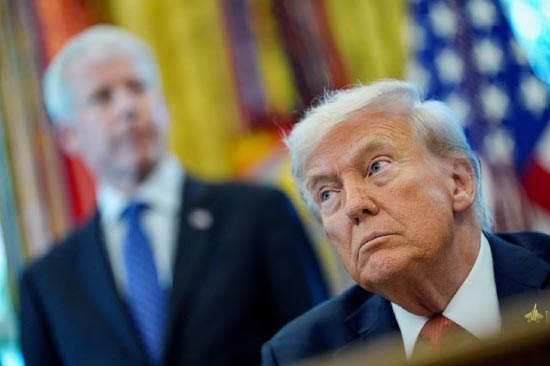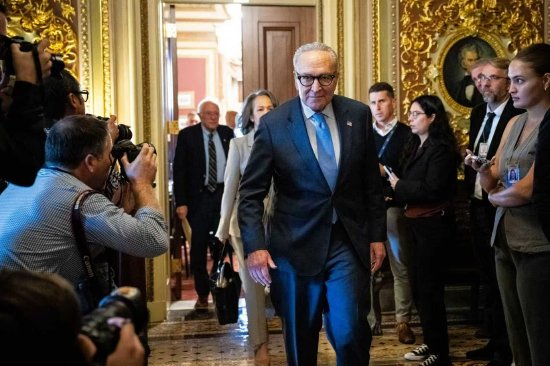US President Donald Trump said he would negotiate with Democrats on healthcare subsidies, a move that could open the door to resolving the government shutdown, which has entered its second week.

"We're talking to the Democrats, and there could be some very good outcomes on healthcare," Trump told reporters at the White House on Monday (October 6), without naming any lawmakers. "I'm a Republican, but I want healthcare more than the Democrats do."
The comments appear to represent a shift in the White House and Republican leadership, which had previously insisted that Democrats must vote to reopen the government before negotiating on Medicare tax credits.
"What Trump is saying is not true—but if he's finally ready to work with Democrats, we're ready to sit down and talk," Senate Democratic leader Chuck Schumer said in a statement. "If President Trump and Republicans are finally ready to sit down and do something about health care for American families, Democrats will be there—and ready to make it happen."
Democrats said they would not support the bill unless it addressed the expiration of ACA subsidies at the end of 2025 and the cuts to Medicaid made in Trump's signature spending law for his second term.
Trump suggested that the current political pressure on both sides was not enough to break the impasse, but said "a lot of good things" could happen soon. He also said that if the shutdown lasted too long, it would eventually lead to layoffs of federal employees.
Earlier on Monday (October 6), when asked whether the president had spoken with Democratic senators, White House press secretary Carolyn Levitt declined to comment, but noted that he had spoken with Republican congressional leaders.
Trump has said he will use the shutdown to lay off thousands of federal employees, who are typically furloughed during a government shutdown. The Senate plans to vote for a fifth time on Monday evening on a stopgap spending bill to keep the government running until November 21st. Kevin Hassett, Trump's top economic adviser, said it's time for Democrats to be "reasonable."
Hassett told CNBC that the president and his senior advisers are closely watching the Senate, which is scheduled to vote again on a bill to fund the government on Monday. Hassett said that if the bill fails, Trump's team in the Oval Office will soon take "drastic measures."
"If Democrats refuse to keep the government open, then the efforts we've been making to make it more efficient may be further accelerated," Hassett said in response to a question about laying off federal employees.
But there are few signs a breakthrough is imminent.
On Monday, House Minority Leader Hakeem Jeffries challenged House Speaker Mike Johnson to a debate.
Johnson declined the invitation, dismissing it as a "desperate attempt by House Democrats to gain attention."
Negotiations to end the federal government shutdown, which began on October 1st, stalled over the weekend. Although Republicans control both chambers of Congress, they still need the support of several Democrats to reach the 60 votes needed to pass a spending bill in the Senate.
Democrats insist on including their healthcare policy demands in a stopgap funding bill, while Republicans want to discuss these issues after the government reopens. One possible solution would be for Republicans to promise a vote on healthcare subsidies before the end of the year, but they have so far been reluctant to do so.
No Return to Washington
House Republicans say they will not return to Washington until the shutdown ends, prompting Senate Democrats to complain about the complete absence of a key negotiating partner. House Republican leaders say they have nothing to do until the Senate passes the stopgap spending bill, which the House has already approved.
The shutdown has shut down all but essential government services, leaving hundreds of thousands of Americans without paychecks and limiting access to government services. Lawmakers may feel even more pressure as federal employees go without paychecks starting October 10th and military personnel go without paychecks on October 15th.
Senate Republicans have so far focused on winning over five more Democrats to break with Jeffries and vote for a short-term, no-strings-attached funding bill to keep the government running until November 21st.

Senate Minority Leader Chuck Schumer attends a vote at the U.S. Capitol in Washington on October 3rd.
Republicans are using a combination of soft and hard tactics: vague promises to discuss subsidies for Obamacare, or the ACA, while threatening massive layoffs and program cancellations. Targets of pressure include Senators Gary Peters of Michigan, Jeanne Shaheen and Maggie Hassan of New Hampshire, and senators representing large numbers of federal employees, such as Mark Warner and Tim Kaine of Virginia.
Moderate grassroots Republicans are acting as intermediaries with moderate Democrats, trying to convince them to keep the government open. Negotiations led by senators like Mike Rounds of South Dakota and Susan Collins of Maine, who advocated for some form of extension of Obamacare subsidies, broke down Thursday evening last week, but they may resume on Monday (October 6).
A person familiar with the matter said Republicans are considering tying some regular-year spending bills to a stopgap appropriations bill to attract support from some Democratic senators.
The person said the bills under negotiation could include spending levels higher than the Trump administration seeks, allowing Democrats to claim some gains. The person also said that Democrats have not yet abandoned their core health care demands, but negotiations between moderates in both parties are continuing.
Johnson told reporters on Monday (October 6) that he had privately promised Senate Spending Committee Leader Patty Murray that the full House would vote on the full-year spending bill proposed by the Appropriations committee.
Democrats say the promise is insufficient.
Democrats said they would not accept a mere commitment to negotiate on Obamacare before December 31 and wanted more substantial concessions from Republicans. Republicans are even unwilling to commit to full House and Senate votes on the issue, saying the issue is too complex to weigh at this time.
In 2017, Republicans unsuccessfully attempted to repeal the ACA, and they have yet to articulate the specific changes they would seek to the system. Conservatives still hope to repeal the popular law and allow a return to high-deductible, limited-coverage health insurance plans, which they say would reduce medical inflation.
Obamacare isn't the only core demand of Democrats. In recent days, they have emphasized the government's refusal to spend money already appropriated by Congress. Democrats say any agreement should include provisions prohibiting the White House budget office from eliminating congressionally funded programs and closing agencies.




